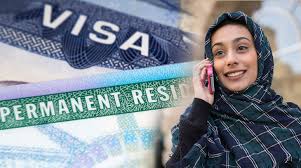 Romance and Immigration Marriage is romantic. Marriages of convenience are not. But if it’s a permanent residency or green card you want, then it’s imperative that you prove to immigration officers that your marriage is in fact, a marriage born out of love and passion. But that’s easier said than done. Consider these questions: “When did you and your spouse last bathe together?” “What did your spouse wear to bed last night?” “Do you and your spouse use condoms?” These are the kinds of question – often asked in separate interviews – which you will have to be prepared to answer. To prove your marriage is real, the government will poke into your private lives and nothing about it will be romantic. No Enemy of Romance It’s not that the U.S. government wants to dampen romance or marital bliss. Quite the contrary, the government knows that it is important on many levels that those legally bound in matrimony deserve to be near and dear to each other. In fact, U.S. immigration laws even have special visas available for fiancées. Every year, almost half-a-million citizens of the United States marry foreign-born folks and petition for them to obtain permanent residence in the U.S. Much of the ponderous bureaucracy and documentation required to obtain residency has been put aside for their benefit. Spouses of U.S. citizens are considered an “immediate relative” under immigration laws. Thus, they are exempt from all numerical quota limitations that could otherwise mean months, sometimes years, of being unable to live together freely and permanently. Raised Eyebrows The U.S. government has made it so easy for an American and a foreigner to get married, that marriage to a U.S. citizen is often referred to as the “fast lane” to permanent residency and a green card. The “immediate relative” status wipes away a number of medical, civil, and criminal bench marks that could possibly prevent a similar unmarried person from even considering a visit to the U.S., much less gaining residency. As a consequence, immigration authorities certainly raise an eyebrow when a foreign-born person marries immediately upon entering the U.S. If a foreigner marries while in the midst of a U.S.C.I.S. legal proceedings to remove them from American soil, the authorities will certainly check the bona fides of that marriage. Going Too Far Any number of circumstances in a petition for permanent residency can cause immigration authorities to wonder about marital bona fides. That marriage to a U.S. citizen is often traded on the international black market probably makes immigration officers a bit over-zealous in trying to weed out marriages of convenience. This over-zealousness has led immigration officers to go too far during marriage interviews. This is where lawyers come in to protect couples they are representing by coaching them on which questions are within and out of bounds of the marriage interview. Usually, the foreigner spouse’s culture makes the situation even more unpleasant. Many immigrants to the U.S. come from countries with many sexual taboos that Westerners can't even imagine. A question as innocuous as, “Do you and your spouse have sex?” is cause for many to blush, squirm, and become tongue-tied. This only casts further aspersions on their attempt to have their marriage declared valid by immigration authorities. Marital Minutiae To understand the breadth and depth of scrutiny perceived marriages of convenience undergo, know that almost nothing about a couple’s private life is spared from questioning – from the mundane to the most private, like sex. Myriad questions concerning the excruciating minutiae of their day-to-day life together, from the color of the bed spread, to where the car keys are kept, and on to the names of aunts and uncles are asked before moving on to the couple’s sex life. Consider again: “Do you and your spouse use condoms?” What if the woman says “No!” to the question, because she knows it's against certain religious tenets and fears perhaps those tenets have some authority in immigration law? What if the husband says “Yes!” because it's true? Sex questions are, at best, meaninglessly embarrassing and, at worst, harassing and confusing and can endanger a couple’s petition for validity. The Ability to Blush One of the great givens in American law is that innocence is presumed until proven otherwise. Also, the dignity and the worth of the individual are prized. It is demeaning to those precepts, as it is demeaning to the couple under scrutiny, to ask unnecessarily detailed questions regarding sex. Does asking perhaps indicate a bit of prurience on the part of the investigators? Questions regarding sexual details really have no place in establishing the bona fides of a marriage. They prove nothing except the ability to blush. The plethora of other questions provides material enough to detect the realities of the relationship. Even though sex is part of the romance of marriage, it does not define a couple’s love and relationship.
0 Comments
 "The chief business of the American people is business." As a nation primarily made up of business people and entrepreneurs, new arrivals who offer needed capital, lively competition, and new ideas are always welcome. America is seeking the influx of new business citizens, because, as in the past, it needs immigrants to keep itself young and adventurous and a leader in the world of business. Immigrants Help American History Repeat Itself Though America has a history full of many stories of astounding success from its immigrant citizens, the nation must have these success stories repeated again and again. Success stories keep American culture moving along, and these stories help keep the nation's torch lit as the best land of opportunity in a world of competing nations. As an immigrant aspiring to do well in any land of business, you should seriously consider becoming another American success story yourself. To enhance the international business opportunities between the two countries, the U.S. offers what is called an “investor's visa” or an E-2 visa. This offers an excellent opportunity to make your money work for you in a vibrant economy of change and opportunity. And it allows you to immigrate to the United States with your family, and perhaps even your key employees. Opportunities Abound America is the land of opportunity and it presents many opportunities to fit your business sense or your business skills. Buying an existing business or franchise is advisable because you will have the benefit of purchasing a company that has an infrastructure that includes customers, suppliers, employees, equipment and systems. But, if you have any business opportunity in mind, knowledgeable sources are available to research the market and provide you with the details to ensure your success. A broad array of well-known American franchise opportunities exist: AAMCO Transmissions, Baskin-Robbins Ice Cream, and Burger King are only a few of what's available. The American service industry offers other options: Advertising, printing and publications, child care, computer services, food processing, real estate, shipping, dry cleaning or laundry, internet services, manufacturing, and the list goes on. So many options are available for those who seek to invest and to succeed in business – to succeed in America. Work permits could become available for a spouse and children. Permits for fellow Filipinos who are crucial to your business success may be able to accompany you. Folks who can manage $60,000 to $500,000 for investment in a U.S. business will find Immigration Services happy to work with them and their business consultants. Share the Wealth, Share the Ideal America is committed to helping business men and business women achieve their goals. To grow wealth is among America's goals. Wealth offers an avenue to the high hopes, to the reasons for being alive. Wealth grows the arts, higher learning, and aid for humanity as a whole. Immigrants excited about business opportunities are always welcome and encouraged to share in that American wealth, that American ideal.  The WWII Philippines Campaign and “Intent to depart the U.S.” "I came out of Bataan and I shall return." That is the full promise made by General Douglas McArthur as he departed the Philippines in 1942. Historians tend to quote only the last part of the vow – historians like things pithy. The general got by with making only a verbal promise that he would return to the Asian islands. A Filipino tourist has to offer hard, verifiable evidence of their “intent to depart the U.S.” once their tourist visa expires. Sight-Seeing and Shopping The American landscape presents so many features and attractions for the curious and eager tourist. Top destinations include San Francisco, The Grand Canyon, Las Vegas, New York, Yellowstone National Park, Disneyland, and the list goes on. Fifty-five million people visited the U.S. last year. They spent an estimated $120 billion while staying here. Shopping was their favorite activity. Close to ninety percent of the tourists in 2009 went shopping in the U.S.  The Elusive Tourist Visa Yes, your “intent to depart the U.S.” will be a prime consideration as U.S. Consulate Officers decide whether or not to grant you a tourist visa. As these visas become more scarce, a number of considerations come into play. So, how do you get a U.S. tourist visa and what kind of proof must you offer to back up your promise to return to the Philippines?
Don't flabbergast the consular officials by stating that the U.S. would be a wonderful place to start a new life. Or about how well-paying jobs are in America. Or how proud you would be if you were a U.S. citizen. These are all noble inclinations, but betraying them will only hinder your quest for a tourist visa. You're visiting – not homesteading.
Pulling It All Together As you prepare to apply for a U.S. tourist visa, pay attention to these important considerations to help ease your way through the process.
Getting Started The best preparation for tackling the somewhat difficult job of getting a U.S. tourist visa, is to visit the U.S. Embassy website. Resources such as Frequently Asked Questions, online forms, case examples and other information will prove to be quite valuable as you take your first steps to visiting America. And don't forget your promise to return.  The day after Donald Trump won the U.S. presidential election, our phone was ringing off the hook. It was pandemonium. We serve many immigrants in our community, and many were downright frightened. We even got emails and calls from out-of-state communities as far east as Florida and New York. The questions were persistent: Should I leave the country now, before they come and get me? Should I go into hiding? What will happen to my children, or to my elderly parents? Will they come to arrest me? Is there anything we can do right now? Should we sell our house? Do we have any legal recourse? Can you defend us, and what will it cost? People are emotional, and they are desperate. “I Would Go Back If Trump Wins” Even before the election, people are already wary. A client of mine from Columbia (whom I’ll call Ella) warned me that she'll leave the country if Trump wins. I remember her concern while in my office a few weeks before the election. "I would go back if Trump wins,” Ella told me, frowning. “This country has many stupid people. I don't know why people are voting for him.” Promises, Policies and Rumors This is kind of panic was expected with a Trump victory. From the outset, Trump has made immigration the centerpiece of his campaign, promising to build an "impenetrable wall" between the U.S. and Mexico to keep illegal immigrants out. He even initially said that Mexico would pay for it. In addition, he promised to revoke Obama's executive actions, Deferred Action for Childhood Arrivals (DACA) and Deferred Action for Parents of Americans and Lawful Permanent Residents (DAPA). Trump has also declared that he would triple the number of U.S. Immigration and Customs Enforcement Agents (ICE). It has been reported that Obama is trying to talk him out of it. We'll see. At the writing of this article, months from his inauguration, Trump has already promised to deport 2 to 3 million immigrants who committed crimes. People speculate that in order to catch this many immigrants, a large deportation force would be necessary. There would be raids, sweeps, and other tactics to find these illegal immigrants. On a recent episode of 60 Minutes, Trump claimed that he is going to remove or incarcerate immigrant drug dealers and gang members. Between now and January 2017, when he is officially inaugurated, the plan may change. Paul Ryan, the U.S. Speaker of the House, is already trying to soften the expectations. He is on the record as saying that there would be no deportation force. But nevertheless, fear and panic are spreading in the immigrant community. Grain of Salt: What’s Already Happening (And What Isn’t) It is extremely difficult to advise people on what to do. We don't want them to go into hiding and abandon their jobs or leave their loved ones, or in any way drastically change their living situation. We don't have any firm information on what Trump will actually do. We have even heard reports that Trump may be softening his intentions on deportation. But frightened people are looking for answers. This is the perfect time for immigrants to become vulnerable to frauds or scams from crooks who may offer deceptive solutions or false hopes. However, you can – and probably should – take all of these promises and intentions with a grain of salt. This is far from the best legal advice, but we need something to make some sense of this immigration debacle. Trump and his cabinet will go slow on this immigration deal. The fact that he intends to deport initially 2-3 million immigrants is not really new, and is not yet cause for alarm or panic. Immigration Under Obama For years now, even with the Obama administration, the Immigration and Custom Enforcement (ICE) has been prioritizing "illegal aliens" with criminal records. In fact, Obama has been criticized as the president who has deported more people than any of the men who have held the office before him. Under the Obama administration, ICE also implemented what's called "prosecutorial discretion." This means that the attorney working on the government's case will have the discretion to pursue a case or choose how a case is handled. There is no mandatory policy to deport or remove an immigrant. What normally happens in these types of cases is that if a "defendant" does not have a criminal record, the government attorney is likely to agree to close the case if there are other immigration relief efforts available. For instance, if the defendant is married to a U.S. citizen and has no criminal record, the case will be "administratively closed" until further notice. But if the defendant has a criminal record, the current laws already make it very tough for the defendant to stay in the U.S. For instance, if you have a record as a drug trafficker, or have committed some other type of felony, there is virtually no immigration relief. You will be deported. It's just a matter of time. But nonetheless, please consult with an attorney. Bottom Line: What Should You Do? For now, people may want to stay under the radar and be careful. I assure you that there is no need to leave the country or sell your possessions. This sort of panic may be premature. In short, you should be cautious, but also slow to act. The government certainly will be. The checks and balances will ensure that you will know well in advance if there is any action that needs to be taken concerning immigration. Until then, proceed as normal. We will keep you posted.  Basically Impossible Face it: There's no way that we have the funds, the apparatus, nor even the national will to round up 11 million human beings and ship them back from whence they came. And the ludicrous declaration by Donald Trump that he would just create a “deportation force” to raid and hunt them down is simply outrageous and dangerous. What’s needed is a humane compromise that allows immigration integration even if the road to US Citizenship remains challenging. Downright Cruel Also, on the face of it, this effort to round up illegal immigrants would be downright cruel. Families would be split for an indeterminable amount of time, if not permanently. Much well-functioning social fabric would be shredded. Like it or not, many undocumented people have established themselves as contributing members of innumerable communities. And there's no doubt that either would weigh heavily on those businesses – construction, agriculture, and service industries among them – that must have affordable labor. These two simple paragraphs I've just written bleed with the unwritten questions they evoke. The biggest being: How do you deal with 11 million people in a humane way that will not adversely affect the social and business realities of today? What's Really Happening Now – Secure Borders and Deportations Trump and the majority of the Republican Party have been moaning about secure borders and deportations. If they checked concrete sources, they'd be ecstatic with our out-going president. Obama has increased our border policing to double what it used to be. Under him deportations have increased to about 400,000 a year due to an ardent emphasis on getting convicted criminals out of the country. And under him the government has ratcheted up spending to about $17 billion a year on immigration enforcement. Checking figures, they would see that this sum is more than is spent by the Drug Enforcement Administration, the F.B.I., and even the Secret Service, combined. So the whining about secure borders and increased deportations doesn't mean much. Social and Labor Complexities Probably one of the biggest quandaries lies with the labor unions, businesses, and internal enforcement of immigration laws. Many unskilled workers, citizens and non-citizens, aren't being paid a living wage. At its present deal of less than eight bucks an hour as a minimum, even that isn't a living wage. When a farmer can pay less than minimum wage to get tomatoes out of his fields, he's going to do it. Of course, even unskilled citizen-laborers can't compete with that and hold an entire household, along with a vehicle, together. Can't Afford to Work So, the contention really isn't the fact that undocumented workers are taking jobs away from American workers; it's that immigrants are the only ones who can afford – by necessity – to work those jobs. Those jobs are better than any they would find in their countries of origin. Yet, on the other hand, the majority of citizen-workers for Walmart must rely on community safety nets for health care and food budget help. Something is just not right and it's not just the immigration issue when it comes down to how all American workers are treated by business interests. Reagan Laid the Trap, Non-Enforcement Sprang It In 1986, President Reagan legalized about three million immigrants without papers. Due to business interests that lobbied to prevent any tough enforcement regarding employers who hired unauthorized workers, no illegal immigration laws were brought to bear. The resulting no-questions-asked job market just lured many more immigrants and that caused a lot of the taking-away-American-jobs backlash. It's ironic that many of the right-wing interests deploring a road to citizenship nowadays probably helped foment the whole situation back during the Reagan years by asking Uncle Sam to look the other way while they put the pickers in the fields. Compromise and Conciliation To be effective, immigration reform should allow folks to come out of hiding. They should be allowed to work, send their children to school and college, even travel abroad, and serve in the military, without fear of deportation while they await their green cards. They probably should not be eligible for any federal benefits and certainly not allowed to vote. But a door must be opened for these people. There is no workable alternative. These compromises are necessary for one of the biggest breakthroughs in immigration reform seen in years. And it is within reach, the gears greased by the last presidential election. This summer action will be hot for Congress to take some decisive steps.  He thought he knew her well. A romantic relationship spanning two years gave him the assurance that this was the real deal. She was the love of his life – a match made in heaven. He longed for the time to settle down with his sweetheart and start a family. The plan was for him to obtain a fiancée visa and join her in California. The day finally came when Mark (fictitious name) flew to the US to join his significant other Susan (fictitious name). But he never expected what was about to happen. A few days after his arrival, Susan started to demand money – lots of money. The wedding was soon in jeopardy. Mark was blindsided by the turn of events. Susan threatened that if there is no payment soon, the wedding is off. Mark’s family and relatives in the U.S. started to panic. A fiancée may enter the U.S. for a 90-day period to marry the U.S. petitioner and apply for permanent residence. This is a very strict requirement. If one does not marry his fiancée , the poor immigrant must return home. There is practically no immigration solution here. When Susan demanded thousands of dollars from Mark as a condition for marriage, Mark faced a monstrous dilemma. Should he cave in and give the money? This may constitute fraud and both may be guilty. Or should he just return home and face humility and ridicule by friends and relatives. The shocking revelation placed Mark in a very vulnerable situation. He left a good job in Manila, sold or gave away all of his belongings and said farewell to friends and relatives. But now he faces a sobering reality of going back empty handed. What Susan may not know is that she may be guilty of extortion or fraud. By pretending that she loved Mark and filing the fiancée application under penalty of perjury, Susan may be committing a crime. This crime may be punishable by fine or imprisonment. This is not an unusual case. There are many who are desperate to leave the Philippines. Out of desperation they rush to join their fiancée in America without full knowledge of their character or personality. Many relationships start online. They chat or express their love via telephone. The relationship may escalate to a short personal meeting. Often the American petitioner will fly to the Philippines to meet the loved one. The fiancée visa application is filed soon after. However at this point, the relationship may be half-baked. A relationship that is not fully developed can turn sour in hurry. Before issuing a visa the consul will interview fiancée in the US Embassy in Manila. The questions will focus on the relationship. Is the relationship legitimate? What are the intentions of the couple? Do they really know one another? Are there factual conflicts between the application and the testimony of the fiancée? Are there any grounds for inadmissibility or reasons to deny the visa? Will there be financial support for the incoming non-immigrant? Once the consul is satisfied that the relationship is genuine, he will issue the visa. Obviously the consul never suspected that Susan intended to defraud Mark. Sadly, Mark is faced with multiple misfortunes. Susan broke his heart, he may need to go back and there is a possibility that he may be unable to return to the US. The moral of this story is simple. Between the cradle and the grave there is no guarantee. Sometimes we need to be prepared for the unexpected. Sometimes we need to expect problems and prepare for find solutions. For Mark, the solution is not yet apparent. But for sure this is only one chapter in his life. Life would go on and who knows, he may meet a Sally who will offer true love. |
Archives
July 2024
Categories
All
|
CONTACT
|
|







 RSS Feed
RSS Feed